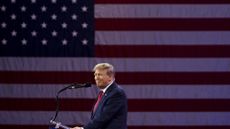The daily business briefing: May 22, 2017
Ford reportedly is replacing CEO Mark Fields, oil prices rise ahead of a key OPEC meeting, and more


1. Ford to replace CEO Mark Fields
Ford Motor is expected to announce Monday that CEO Mark Fields is retiring, people briefed on the move tell The Associated Press and The New York Times. Fields, 56, reportedly will be replaced by Jim Hackett, the head of the Ford subsidiary that works on autonomous vehicles and former chief executive of office-furniture company Steelcase Inc. Fields is being pushed out after presiding over a 40 percent plunge in the company's stock price in three years as chief executive. He has been at the company 28 years. Investors criticized him for lagging behind peers in creating electric vehicles and advancing toward self-driving autos, while also letting some core products grow stale. Hackett, who has led Ford's mobility unit since last year, was credited with reversing Steelcase's declining fortunes, in part by foreseeing the shift from cubicles to open office floor plans.
The Associated Press The New York Times
2. Oil prices rise ahead of key OPEC meeting
Oil prices rose on Monday to their highest level in a month ahead of a meeting this week where leaders from the Organization of Petroleum Exporting Countries and other major oil producers are expected to agree to expand production cuts. The original six-month agreement to reduce output by 1.8 million barrels a day is due to expire in June, but analysts are nearly unanimous in predicting that the deal will be extended at the OPEC meeting on Thursday, although the length of the extension and the severity of production cuts remain open questions. Early Monday, both Brent crude and West Texas Intermediate futures were trading up 0.7 percent.
Subscribe to The Week
Escape your echo chamber. Get the facts behind the news, plus analysis from multiple perspectives.

Sign up for The Week's Free Newsletters
From our morning news briefing to a weekly Good News Newsletter, get the best of The Week delivered directly to your inbox.
From our morning news briefing to a weekly Good News Newsletter, get the best of The Week delivered directly to your inbox.
3. Lockheed Martin and Boeing shares gain following Saudi deals
Lockheed Martin and Boeing shares rose in pre-market trading on Monday after the companies snagged major contracts as part of the $350 billion in deals for the U.S. and American companies announced during President Trump's two-day visit to Saudi Arabia. Lockheed won about $28 billion in contracts, sending its stock rising by nearly 3 percent. Shares in Boeing, which sealed a deal to sell Saudi Arabia both passenger and military aircraft, jets, and military helicopters, rose by 0.5 percent early Monday, adding to 2 percent gains on Friday. Boeing will sell Saudi Arabia Chinook military transport helicopters, as well as associated equipment and training services. The company did not immediately announce the price and number of civilian and military aircraft included in the deal.
4. Swiss voters approve ban on new nuclear plants
Swiss voters on Sunday backed a government plan to ban new nuclear plants and provide billions of dollars in subsidies for renewable energy. The binding referendum won the support of 58 percent of voters, who have final say on major policy issues in Switzerland. The binding referendum was called in a bid to help bail out struggling utilities. "The results shows the population wants a new energy policy and does not want any new nuclear plants," Energy Minister Doris Leuthard said. "The law leads our country into a modern energy future." The plan calls for a four-fold increase in solar and wind power by 2035. Backers and opponents of the proposal differed widely on how much it would cost the average family, with Leuthard saying it would cost families very little, while critics put the cost at $3,290 annually per family.
5. Trade ministers agree to pursue TPP without the U.S.
Pacific Rim trade ministers on Sunday committed to moving forward with the Trans Pacific Partnership trade pact, even though President Trump has pulled the U.S. out of the agreement. Trump says he wants to focus on bilateral trade deals. The TPP as written requires the participation of the U.S., so the 11 remaining countries will have to make changes to revive the deal. The departure of the U.S., the world's largest economy, would shrink the deal considerably, but the remaining countries represent about 13.5 percent of the global economy. New Zealand Trade Minister Todd McClay said the participants would welcome new signatories, provided they accept the TPP's high labor and environmental protection standards.
Sign up for Today's Best Articles in your inbox
A free daily email with the biggest news stories of the day – and the best features from TheWeek.com
Harold Maass is a contributing editor at The Week. He has been writing for The Week since the 2001 debut of the U.S. print edition and served as editor of TheWeek.com when it launched in 2008. Harold started his career as a newspaper reporter in South Florida and Haiti. He has previously worked for a variety of news outlets, including The Miami Herald, ABC News and Fox News, and for several years wrote a daily roundup of financial news for The Week and Yahoo Finance.
-
 Has the Taliban banned women from speaking?
Has the Taliban banned women from speaking?Today's Big Question 'Rambling' message about 'bizarre' restriction joins series of recent decrees that amount to silencing of Afghanistan's women
By Harriet Marsden, The Week UK Published
-
 Cuba's energy crisis
Cuba's energy crisisThe Explainer Already beset by a host of issues, the island nation is struggling with nationwide blackouts
By Rebekah Evans, The Week UK Published
-
 Putin's fixation with shamans
Putin's fixation with shamansUnder the Radar Secretive Russian leader, said to be fascinated with occult and pagan rituals, allegedly asked for blessing over nuclear weapons
By Harriet Marsden, The Week UK Published
-
 Chimpanzees are dying of human diseases
Chimpanzees are dying of human diseasesUnder the radar Great apes are vulnerable to human pathogens thanks to genetic similarity, increased contact and no immunity
By Harriet Marsden, The Week UK Published
-
 Deaths of Jesse Baird and Luke Davies hang over Sydney's Mardi Gras
Deaths of Jesse Baird and Luke Davies hang over Sydney's Mardi GrasThe Explainer Police officer, the former partner of TV presenter victim, charged with two counts of murder after turning himself in
By Austin Chen, The Week UK Published
-
 Quiz of The Week: 24 February - 1 March
Quiz of The Week: 24 February - 1 MarchPuzzles and Quizzes Have you been paying attention to The Week's news?
By Sorcha Bradley, The Week UK Published
-
 Will mounting discontent affect Iran election?
Will mounting discontent affect Iran election?Today's Big Question Low turnout is expected in poll seen as crucial test for Tehran's leadership
By Sorcha Bradley, The Week UK Published
-
 Sweden clears final NATO hurdle with Hungary vote
Sweden clears final NATO hurdle with Hungary voteSpeed Read Hungary's parliament overwhelmingly approved Sweden's accession to NATO
By Peter Weber, The Week US Published


